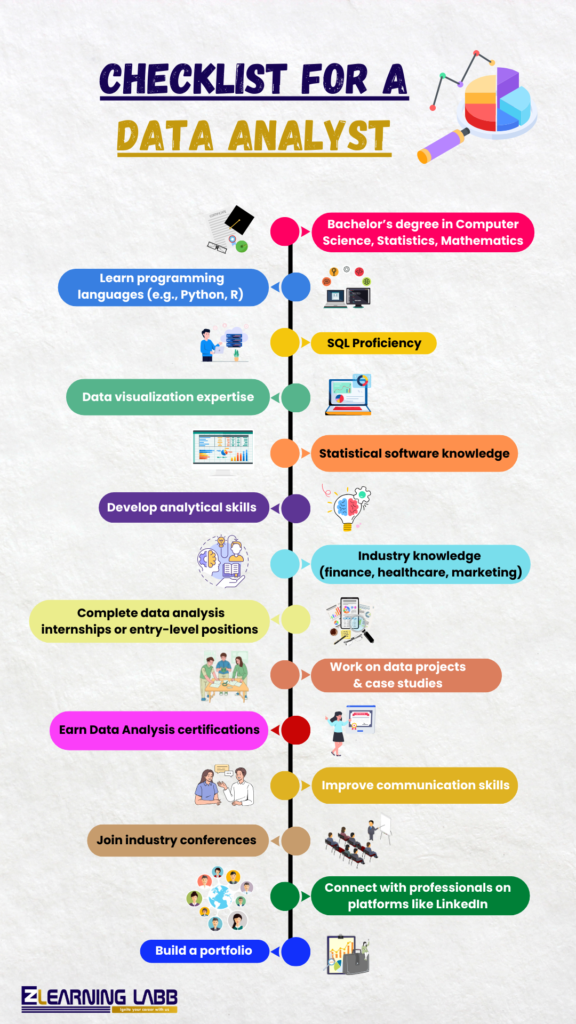Data Analyst Interview Questions SQL: SQL aka Structured Query Language is one of the most important programming languages designed for working with large sets of databases. And when it comes to preparing for a data analyst interview, SQL is one of the most important topics to focus on.
In this blog by Ze Learning Labb, we will cover some essential data analyst interview questions SQL to help you prepare for your interview. Read on…
This article contains the following:
- SQL Technical Interview Questions Data Analyst
- SQL Coding Interview Questions Data Analyst
- Common SQL Interview Questions Data Analyst
Data Analyst Interview Questions SQL
Understanding SQL is crucial for any data analyst – it is basically the root of data analysis. Data analyst interview questions SQL often cover various aspects of SQL, including syntax, functions, and practical applications. Here are some common categories of questions to get you started:
- Basic SQL commands: Be prepared to answer questions about SELECT, INSERT, UPDATE, DELETE, and other fundamental SQL commands.
- Joins and subqueries: Expect questions about how to join tables and use subqueries to retrieve data.
- Aggregate functions: Know how to use functions like COUNT, SUM, AVG, MAX, and MIN to perform calculations on data.
- Data types: Understand different SQL data types and when to use them.
- Indexing and optimization: Be ready to discuss how indexing works and ways to optimize SQL queries for better performance.
Data Analyst Interview Questions SQL: Technical Interview Questions Data Analyst
SQL technical interview questions for data analysts are designed to test your technical skills and understanding of SQL. These questions are more in-depth and often require a solid understanding of SQL principles and best practices. Here are some samples of SQL technical interview questions data analyst:
1. What is SQL?
2. What are the different types of SQL commands?
3. How do you create a table in SQL?
4. How do you insert data into a table?
7. How do you update existing data in a table?
8. How do you delete data from a table?
9. How do you retrieve data from a table?
10. How do you filter data using the WHERE clause?
11. How do you sort data in SQL?
12. How do you use the GROUP BY clause?
12. How do you filter grouped data using the HAVING clause?
13. What are the different types of joins in SQL?
14. How do you use a subquery in SQL?
15. What is a self-join?
16. What is a correlated subquery?
16. What are window functions in SQL?
17. How do you use the CASE statement in SQL?
18. What are CTEs (Common Table Expressions)?
19. How do you handle NULL values in SQL?
20. What are indexes in SQL and why are they used?

SQL Technical Interview Questions Data Analyst: Practice Questions
1. Find the second highest salary from the employee’s table.
sql
Copy code
SELECT MAX(salary)
FROM employees
WHERE salary NOT IN (SELECT MAX(salary) FROM employees);
2. Retrieve the names of employees who have the highest salary in each department.
sql
Copy code
SELECT department, employee_name, salary
FROM employees e
WHERE salary = (SELECT MAX(salary)
FROM employees
WHERE department = e.department);
3. Count the number of employees in each department.
sql
Copy code
SELECT department, COUNT(*) AS employee_count
FROM employees
GROUP BY department;
4. List all employees and their managers.
sql
Copy code
SELECT e.employee_name AS Employee, m.employee_name AS Manager
FROM employees e
LEFT JOIN employees m
ON e.manager_id = m.employee_id;
Data Analyst Interview Questions SQL: SQL Coding Interview Questions Data Analyst
SQL coding interview questions for data analysts focus on your practical ability to write SQL code. Ze Learning Labb can help you here with questions specifically designed for data analyst role, covering a variety of difficulty levels and focusing on practical scenarios. Check out these examples of SQL coding interview questions data analyst below:
1. Retrieve all columns from the Employees table.
sql
Copy code
SELECT * FROM Employees;
2. Select the FirstName and LastName of all employees in the Employees table.
sql
Copy code
SELECT FirstName, LastName FROM Employees;
3. Find all employees who have a salary greater than $50,000.
sql
Copy code
SELECT * FROM Employees WHERE Salary > 50000;
4. Count the total number of employees in the Employees table.
sql
Copy code
SELECT COUNT(*) AS TotalEmployees FROM Employees;
5. List all unique job titles in the Employees table.
sql
Copy code
SELECT DISTINCT JobTitle FROM Employees;
6. Retrieve the top 5 highest-paid employees.
sql
Copy code
SELECT * FROM Employees ORDER BY Salary DESC LIMIT 5;
7. Find the average salary for each department.
sql
Copy code
SELECT DepartmentID, AVG(Salary) AS AverageSalary FROM Employees GROUP BY DepartmentID;
8. List the employees who do not have a manager.
sql
Copy code
SELECT * FROM Employees WHERE ManagerID IS NULL;
9. Get the number of employees in each department, but only include departments with more than 5 employees.
sql
Copy code
SELECT DepartmentID, COUNT(*) AS EmployeeCount
FROM Employees
GROUP BY DepartmentID
HAVING COUNT(*) > 5;
10. Find the employees who were hired in the year 2020.
sql
Copy code
SELECT * FROM Employees WHERE YEAR(HireDate) = 2020;

11. Retrieve the names and salaries of employees whose salaries are above the average salary in their department.
sql
Copy code
SELECT e.FirstName, e.LastName, e.Salary
FROM Employees e
WHERE e.Salary > (SELECT AVG(Salary)
FROM Employees
WHERE DepartmentID = e.DepartmentID);
12. Find the department with the highest average salary.
sql
Copy code
SELECT DepartmentID
FROM Employees
GROUP BY DepartmentID
ORDER BY AVG(Salary) DESC
LIMIT 1;
13. List the employees along with their manager’s name.
sql
Copy code
SELECT e.EmployeeID, e.FirstName AS EmployeeName, m.FirstName AS ManagerName
FROM Employees e
LEFT JOIN Employees m ON e.ManagerID = m.EmployeeID;
14. Calculate the cumulative salary of employees, ordered by their hire date.
sql
Copy code
SELECT EmployeeID, FirstName, LastName, Salary,
SUM(Salary) OVER (ORDER BY HireDate) AS CumulativeSalary
FROM Employees
ORDER BY HireDate;
15. Find the second highest salary in the Employees table.
sql
Copy code
SELECT MAX(Salary) AS SecondHighestSalary
FROM Employees
WHERE Salary < (SELECT MAX(Salary) FROM Employees);
16. Identify employees who earn more than the highest salary in the Sales department.
sql
Copy code
SELECT e.EmployeeID, e.FirstName, e.LastName, e.Salary
FROM Employees e
WHERE e.Salary > (SELECT MAX(Salary)
FROM Employees
WHERE DepartmentID = (SELECT DepartmentID
FROM Departments
WHERE DepartmentName = ‘Sales’));
17. List all employees and the number of employees they manage.
sql
Copy code
SELECT e.EmployeeID, e.FirstName, e.LastName, COUNT(m.EmployeeID) AS ManagedEmployees
FROM Employees e
LEFT JOIN Employees m ON e.EmployeeID = m.ManagerID
GROUP BY e.EmployeeID, e.FirstName, e.LastName;
18. Find the employees who have the highest salary in each department.
sql
Copy code
WITH DepartmentMaxSalaries AS (
SELECT DepartmentID, MAX(Salary) AS MaxSalary
FROM Employees
GROUP BY DepartmentID
)
SELECT e.EmployeeID, e.FirstName, e.LastName, e.Salary, e.DepartmentID
FROM Employees e
JOIN DepartmentMaxSalaries dms ON e.DepartmentID = dms.DepartmentID AND e.Salary = dms.MaxSalary;
19. Calculate the year-over-year salary increase for each employee.
sql
Copy code
SELECT EmployeeID, YEAR(HireDate) AS Year, Salary,
Salary – LAG(Salary) OVER (PARTITION BY EmployeeID ORDER BY HireDate) AS SalaryIncrease
FROM Employees;
20. Find the employees who were hired on the same date as their manager.
sql
Copy code
SELECT e.EmployeeID, e.FirstName, e.LastName, e.HireDate
FROM Employees e
JOIN Employees m ON e.ManagerID = m.EmployeeID AND e.HireDate = m.HireDate;
How To Practice Technical Data Analyst Interview Questions?
- Make sure you understand the structure of the tables and relationships between them.
- Decompose complex queries into smaller parts and solve each part step-by-step.
- Test your queries on sample data to ensure they return the expected results.
- Aim to write efficient queries, especially for large datasets.
- Comment your SQL code for clarity, especially in complex queries.

Data Analyst Interview Questions SQL: 10 Common SQL Interview Questions Data Analyst
Some common SQL interview questions for data analysts assess your basic knowledge and problem-solving skills. These questions may include the following:
1. What is SQL and why is it important for Data Analysts?
2. What are the different types of SQL commands?
3. How do you create a table in SQL?
4. How do you insert data into a table?
5. How do you update data in a table?
6. How do you delete data from a table?
7. How do you retrieve data from a table?
8. How do you filter data using the WHERE clause?
9. How do you sort data in SQL?
10. What are joins and their types?
On A Final Note…
Apart from all the questions Ze Learning Labb has mentioned above, to excel better than others in the data analyst interview focused on SQL, make sure you practice writing and optimizing SQL queries, possess proper knowledge of database design and normalization principles. Also, you need to be well-familiarised with common SQL functions and their use cases.
By preparing thoroughly with these data analyst interview questions SQL, you’ll be well-equipped to demonstrate your SQL proficiency and secure that data analyst position – it’s a ZELL guarantee! For more information, visit the site here.
Good luck!





